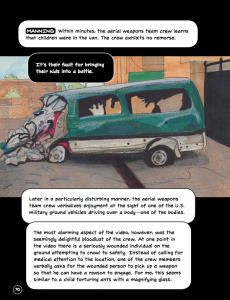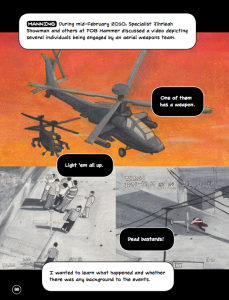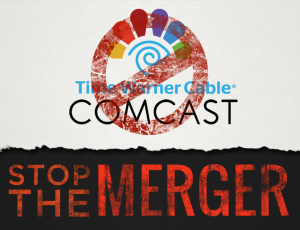Podcast: Play in new window | Download
Updates:
- NSA Collecting MetaData And Content On Five Countries
- Julian Assange-Glenn Greenwald Twitter Storm
- Host Discussion On NSA Ubiquitous Data Collecting
——-
The United States vs. Private Chelsea Manning
Last year our own Michael Ratner made many trips to Fort Meade to attend the very secretive Private Chelsea Manning trials. Michael had also explained in past shows about how he heard Chelsea testify as to why he released each set of documents such as the Iraq war logs, the Afghanistan war logs, State Department cables and more. She said her decision to release the documents were done as an act of conscience. Our guest Wikileaks activist and artist Clark Stoeckley was also at this historic trial. His recent graphic novel titled The United States vs. Private Chelsea Manning is a collection of his vivid sketches from inside the court room. He joins us to talk about his work as an activist and his experiences producing the book. Welcome to Law and Disorder.
- As I understand the transcripts are still under seal.
- Those sketches took a little bit longer, ones that where full court room where I drew a lot of people.
- I would work in pencil and draw as quickly as I could everything that I saw in the court room and then I would come back and fill it in with color and hard outlines.
- What she was doing was offering up 20 years of her life, accepting full responsibility and that takes a lot of courage and bravery to do that – being the smallest person in the court room and being noble about it.
- Unfortunately the media wasn’t there to catch the pre-trial. They only showed up on the first day and then the sentencing and the verdict.
- I remember how the court room fell to a complete silence when that video came on and the tears, and the blank stares on the prosecutions’ faces.
- I’m looking through the book right now, I see you, you’re in the picture there Michael Ratner, in the background sitting behind Chelsea.
- 35 years was the sentence and that’s going to be appealed. As I understand the appeal will start as early as December.
- They didn’t like that we’re holding vigils every week and holding large protests there. They shut down the road and they had to re-route traffic. It was the largest protest Ft. Meade had every seen.
- Just a heads up to anyone who wants to correspond with Chelsea, you know have to use the name Chelsea when addressing envelopes. http://www.chelseamanning.org/
- I just started putting them in libraries today.
- CHELSEA E. MANNING 89289 / 1300 NORTH WAREHOUSE ROAD / FORT LEAVENWORTH, KANSAS 66027-2304
Guest – Clark Stoeckley, is an artist and author of the book The United States v. Private Chelsea Manning. He’s also the owner of truck with the WikiLeaks logo emblazoned on it. Stoeckley’s vivid sketches from inside the court and beyond, together with carefully selected transcripts of the proceedings, trace the arguments as they move back and forth between the defense and the prosecution.
——-
Net Neutrality – The Time Warner/Comcast Merger and New Rules Proposed By The FCC
In our last interview with attorney Matt Wood, policy director at Free Press, we talked about the 45 billion dollar Comcast -Time Warner merger and its implications to net neutrality. This proposed merger would unite the nation’s largest cable TV and internet service provider with the second largest cable company. If combined, these companies would offer service to two thirds of U.S. households. We get an update on the merger and we also discuss the new rules proposed by the FCC about net neutrality. Net neutrality essentially means preventing unreasonable discrimination against content on the internet. The Free Press maintains that the new FCC rules would kill rather than protect net neutrality and allow rampant discrimination online.
- What the court said was that you can’t treat broadband providers as common carriers – not as some insurmountable conclusion but simply based on the way the FCC has decided to treat them up to this point.
- So the FCC up to this point has tried to deregulate and yet tried to maintain some of the protections we all need from our communications.
- Though its in the FCC’s discretion according to the majority and according to the DC circuit, what the courts have said, the FCC has made this decision in the past. They still haven’t reversed it, they still want to say that broadband is not a common carrier service and therefore the FCC can’t adopt common carrier or common carrier like obligations for broadband.
- There’s obviously a grave concern to government secrecy and censorship especially when it comes to whistle-blowers and the kind of information that Edward Snowden brought to all of us.
- If you used the phone to commit a crime whether that is wire fraud or you’re talking to your co-conspirators about how to conduct the crime. It is not the telephone company’s place and either say you can or can’t make that call.
- Net neutrality is a way of insuring that the carrier of our speech (that’s typically a private company) doesn’t have a role or not in deciding whether that speech goes through.
- If and when the government steps in and says hey we want to tap that line because we’re actually conducting an investigation or if and when there’s a punishment for the activity that you used the phone to plan that’s obviously a very important legal debate.
- Net neutrality is not a way for the government to control our speech. It is a way to insure that our cable and phone companies do not control our speech.
- The FCC in its current mode is basically saying well even if we’re required to allow these two tiers or multiple tiers of service, we can still step in and protect you and provide a basic level of service.
- This isn’t just about big internet companies on one side and big telephone and cable companies on the other side, its about that we all use the internet especially in a cloud based system. We’re using it not just to watch movies which is an important cultural activity but to back up our files, to send educational videos.
- What the cable and telephone companies want to do is charge you extra to reach their customers and they want to charge in both directions.
- If you want to reach them at all Netflix or Google, Law and Disorder, you also have to pay us now.
- Its no secret that FCC Chairman Wheeler headed not just one but two telecommunication lobbies.
- The FCC has this proceeding that it will be running over the summer. What Chairman Wheeler has proposed we think is not good enough but its not a done deal either so the FCC will take comments not only from companies and groups like ours but members of the public.
Guest – Attorney Matt Wood helps shape the policy team’s efforts to protect the open Internet, prevent media concentration, promote affordable broadband deployment and prioritize a revitalized public media. Before joining Free Press, he worked at the public interest law firm Media Access Project and in the communications practice groups of two private law firms in Washington, D.C. Before that, he served as editor-in-chief for the Harvard Civil Rights-Civil Liberties Law Review, worked for PBS, and spent time at several professional and college radio and television stations. Matt earned his B.A. in film studies from Columbia University and his J.D. from Harvard Law School.
—————————————————————————
![]()
Please help support Law and Disorder, the show is now a sponsored project of Fractured Atlas, a non-profit arts service organization. Contributions for the charitable purposes of Law and Disorder must be made payable to Fractured Atlas only and are tax-deductible to the extent permitted by law.



